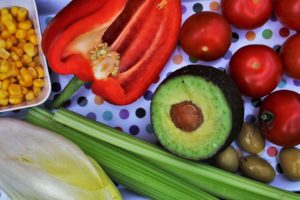Women who are pregnant usually need a new routine, both when it comes to eating and taking care of their body. When we talk about food, for example, it’s always important to be conscious that the woman is eating for two and to know what is healthiest and what should be avoided during this period1.
However, sometimes it is inevitable that diseases like gestational diabetes appear. And when that happens, care must become even stricter. That’s why today we are going to talk about food choices for those with gestational diabetes. But first, we need to talk about what this condition actually is.
What is gestational diabetes?
Gestational diabetes2 is simply a type of diabetes that causes a high level of sugar in the blood of a pregnant woman, called hyperglycemia. It occurs in women who did not have diabetes before pregnancy and disappears after childbirth.
It usually appears in the third trimester of pregnancy, and about 7% of women have this issue. The chances of developing diabetes after giving birth are also increased.
This disease is caused by problems with the production, secretion, or action of the hormone insulin in the pancreas, or a combination of these factors. This hormone is crucial for allowing sugar to be used as a source of energy and for storing excess sugar. When there is any problem with the production of this hormone, a person becomes diabetic. In the case of pregnant women, this can be directly related to certain hormones from the pregnancy that end up preventing the pancreas from producing insulin correctly.
There are a few risk factors for this disease, such as obesity, or the age of the woman— the older the woman, the higher her chances of developing this condition. Other factors include family history and intolerance to sugar in the body, also known as pre-diabetes3.
Gestational diabetes can be a dangerous condition if not treated properly, posing a number of risks to the health of both the mother and the baby. Among the main risks are obesity, birth defects in the baby, and even early death. For this reason, it’s necessary to get proper treatment and strictly follow medical recommendations.
And many of these recommendations are directly related to the pregnant woman’s diet. That’s why it’s so important to discuss food choices for those with gestational diabetes.
Why is food important?
Before we discuss the best foods to eat, we need to talk about why this is so important. The main reason is because of the high blood sugar levels, which can cause symptoms like tiredness, fatigue, blurry vision, among other things.
That’s why the diet for gestational diabetes must be planned so that sugar levels remain balanced. And for that to happen, not only must the right foods be eaten, but also in the right amount and at specific times of the day. This is the best way to take care of yourself and not let gestational diabetes affect you or your baby.
What to eat with gestational diabetes?
The most recommended foods are those with a low glycemic index, meaning foods with little sugar. In addition, it is important to eat foods that make carbohydrates break down more slowly in the body, making it easier to control blood sugar. High-fiber foods are also great options to help with this diet.
Recommended foods:
- Nuts and seeds
- Fish like salmon, sardines, and tuna
- Fruits with peel and fibrous pulp so the sugar is absorbed slowly
- Oats and various types of whole grains
- Skinless chicken
- Vegetables and greens such as spinach, carrots, cauliflower, chayote, and eggplant, preferably raw
- White cheese
- Skim milk
- Low-fat yogurt
- Chickpeas
- Beans
- Lentils
All these foods can be combined in a healthy diet that must be strictly followed so that the woman does not develop any complications from the disease.
How many times a day should I eat?
When we talk about the diet for someone with gestational diabetes, it’s not enough to just mention which foods are best. It’s also important to explain how these foods should be eaten throughout the day. A good meal plan looks like this:
Breakfast – Fruits (fresh, frozen, or dried), yogurt, boiled eggs, milk, cheese, cereals, and nuts.
Morning snack – Whole grain bread, white cheese, yogurt, cereals.
Lunch – Various types of vegetables both as the main dish and in salads, lean meats such as chicken or fish, eggs. For dessert, a fruit with peel.
Afternoon snack – Can be similar to the morning snack, with options like nuts, cereals, whole grain breads, and white cheese.
Dinner – Brown rice, whole grain pasta, meat, vegetables like potatoes and sweet potatoes. Don’t forget the salad, always with raw greens.
Evening snack – A piece of fruit or a glass of milk
Of course, the options for each meal can vary, as long as they follow the rule of controlling blood sugar in the body. Still, it’s important to always stay well-nourished so that neither your health nor your baby’s is at risk.
What not to eat with gestational diabetes?
It’s also extremely important to mention what should not be eaten when you have gestational diabetes. These are foods that must be avoided at all costs and can be harmful to both mother and baby. Some of them include:
- Sweets, especially processed sweets, but not only
- Sodas
- Chocolate
- Butter
- Fried foods in general
- Whole milk and full-fat yogurt
- Alcoholic beverages
- Fatty meats
Other ways to control gestational diabetes
In addition to keeping a healthy diet, practicing physical activity also helps women control their blood sugar levels. Of course, the exercises should be specific for pregnant women so that no other complications arise. Even so, they are a great option.
In some cases, a doctor may recommend specific medications to be taken together with diet and exercise. It’s never good to develop a disease during pregnancy, especially if it appears precisely because of pregnancy.
But many times this is unavoidable, and what you must do is take the utmost care so the disease does not become a headache and a cause for concern during this period. Gestational diabetes can be dangerous, but it can often be controlled, especially when the diet is followed properly. So if you have this condition, follow your diet as best you can so that nothing more serious happens during your pregnancy.
See also: Maternal Weight Gain After Pregnancy Can Increase The Chances of Childhood Obesity
Photo: pasja1000












